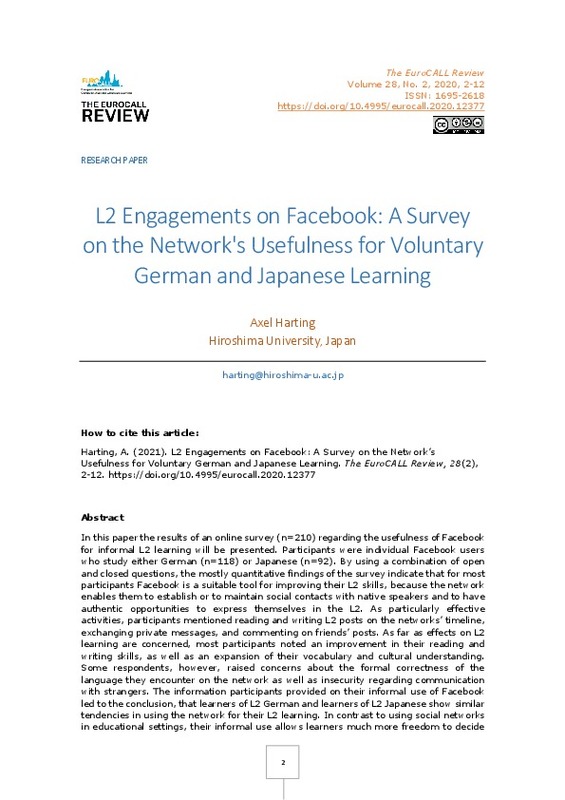Alm, A. (2015). Facebook for informal language learning: Perspectives from tertiary language students. The EUROCALL Review, 23(2), 3-18. https://doi.org/10.4995/eurocall.2015.4665
Araya Ríos, J. & Campos, L. E., (2015). The Role of Facebook in Foreign Language Learning. Revista de Lenguas Modernas, 23, 253-262. https://doi.org/10.15517/rlm.v0i23.22349
Dizon, G. (2015). Japanese students' attitudes toward the use of Facebook in the EFL classroom. The Language Teacher, 39(5), 9-14. https://doi.org/10.37546/JALTTLT39.5-2
[+]
Alm, A. (2015). Facebook for informal language learning: Perspectives from tertiary language students. The EUROCALL Review, 23(2), 3-18. https://doi.org/10.4995/eurocall.2015.4665
Araya Ríos, J. & Campos, L. E., (2015). The Role of Facebook in Foreign Language Learning. Revista de Lenguas Modernas, 23, 253-262. https://doi.org/10.15517/rlm.v0i23.22349
Dizon, G. (2015). Japanese students' attitudes toward the use of Facebook in the EFL classroom. The Language Teacher, 39(5), 9-14. https://doi.org/10.37546/JALTTLT39.5-2
Dizon, G. (2016). A comparative study of Facebook vs. paper-and-pencil writing to improve L2 writing skills. Computer Assisted Language Learning, 29(8), 1249-1258. https://doi.org/10.1080/09588221.2016.1266369
Harting, A. (2017). Using Facebook to improve L2 German students' socio-pragmatic skills, The EuroCALL Review, 25(1), 26-35. https://doi.org/10.4995/eurocall.2017.7014
Harting, A. (2018). Schwierigkeiten bei der Bewältigung von Facebook-Aufgaben im Deutschunterricht in Japan, Neue Beiträge zur Germanistik, 157, 155-179. https://doi.org/10.11282/jgg.157.0_155
Leier, V. & Cunningham, U. (2016) "just facebook me" A study on the integration of Facebook into a German language curriculum. Limassol, Cyprus: EUROCALL conference: 260-264. https://doi.org/10.14705/rpnet.2016.eurocall2016.572
Manca, S. & Ranieri, M. (2016). Facebook and the others. Potentials and obstacles of Social Media for teaching in higher education. Computers & Education, 95(1), 216-230. https://doi.org/10.1016/j.compedu.2016.01.012
Prichard, C. (2013). Training L2 Learners to Use Facebook Appropriately and Effectively. CALICO Journal, 30(2), 204-225. https://doi.org/10.11139/cj.30.2.204-225
Promnitz-Hayashi, L. (2011). A learning success story using Facebook. Studies in Self-Access Learning Journal, 2(4), 309-316. https://doi.org/10.37237/020408
Sim, M. A. & Pop, A. M. (2014). The impact of social media on vocabulary learning case study: Facebook, Annals of the University of Oradea, Economic Science Series, 23(2), 120-130.
Stevenson, M.P., & Liu. M. (2010). Learning a language with Web 2.0: Exploring the use of social net-Learning a language with Web 2.0: Exploring the use of social net-working features of foreign language learning websites. CALICO Journal, 27, 233-259. https://doi.org/10.11139/cj.27.2.233-259
Wang, S., & Vasquèz, C. (2012). Web 2.0 and second language learning: what does the research tell us? CALICO Journal, 29(3). 412-429. https://doi.org/10.11139/cj.29.3.412-430
Waragai, I., Kurabayashi, S., Ohta, T., Raindl, M., Kiyoki, Y. & Tokuda, H. (2014). Context-aware writing support for SNS: connecting formal and informal learning. In L. Bradley & S. Thouësny (Eds.), CALL design: principles and practice. Proceedings of the EUROCALL 2014 Conference, 403-407. https://doi.org/10.14705/rpnet.2014.000253
White, J. (2009). The use of Facebook to improve motivation and academic writing. Proceedings of the Third International Wireless Ready Symposium, 28-32.
[-]








